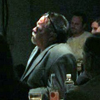In a stunning musical tribute to Black History Month, pianist Joshua White blew the roof off at UC San Diego’s Loft on Friday night with (((CODES))), a celebration of the poetic contributions of the African-American poets Langston Hughes, Frances Harper, Amiri Baraka, Al Young and Maya Angelou, as well as the profound art of the spiritual in a showstopping performance that earned a standing ovation from the packed house.
White assembled a stellar cast for this show, featuring the L.A. musicians Marvin "Smitty" Smith (drums), Dwight Trible (voice) and Hamilton Price (bass) to complement local standouts Kamau Kenyatta (soprano saxophone) and the incredible Janet Wilson (vocals).
Trible is a veteran of the Los Angeles creative music scene, having cut his teeth as a member of Horace Tapscott’s Arkestra, and Trible's deep, pliant baritone, emotive articulation and operatic presence was felt immediately on the opening duet with White, on Hughes' "Spiritual." Half-singing, half-narrating, Trible made you connect with the meaning behind the words -- and his aesthetic made me reflect on a James Earl Jones-Leon Thomas-Albert Ayler continuum. Underneath it all, the pianist mined lush harmony and catholic voice leading.
Wilson comes from the Calvary Baptist Church here in San Diego, and from the moment she and White embarked on "Lift Every Voice and Sing," the spiritual vibrations in the room ascended to a level powerful enough to transform this committed atheist into a believer -- if only for a moment. Wilson’s rich and soulful contralto soars and growls, and White’s hyperlyrical piano made the supernatural seem inarguable.
Trible joined the band on a dramatic reading of Harper’s "Bury Me in a Free Land," improvising and weaving the text around White’s nervous disconnections, Price’s probing forays and Smith’s agitated brushwork. As the vocalist upped the ante, White’s long, strong fingers stabbed the keyboard like pneumatic daggers, while Smith’s roiling percussion extended the thunderous innovations of Elvin Jones -- apropos to Kenyatta’s hoarse, serpentine windings.
In a night filled with highlight moments, my personal favorite came on a brand-new, as-yet-untitled White original, which brought the house down. Opening with resonant tones and verdant harmonies, a recurrent ostinato led straight into Kenyatta’s breathy melody, which yielded to an extended solo congruent with ‘Trane-ish fluidity and the dry cough of Steve Lacy, fueled by the boiling rage of Smith’s inner mounting flame. White’s own contribution was a potent cocktail of joyous melodic development woven through a latticework of daunting rhythmic cells and Newtonian logic.
Trible took "Deep River," to a naked and visceral landscape, imbuing the storytelling dynamic with fluid enunciation, and his duet with Smith on Angelou’s "I Know Why the Caged Bird Sings"grew from an exchange of soft clicks and rattles beneath a pensive recitation into an intoxicating melange of tribal polyrhythms and yearning moans.
A Smith drum solo filled with gunshots and bullwhips led directly into the trance-vamp arrangement of "Summertime," rocketing off White’s modal chords, which evoked the left hand of both McCoy Tyner and Joe Frazier-- powerful enough to knock you down with a smile on your face. Kenyatta snaked his way through the length of his horn with a chirping vibrato and throaty multiphonics as White toggled between quartal harmonies and brutal clusters, taking the piece into a Dante’s inferno of seething energy.
And that was just the first set.
Wilson and White opened the second set with a stirring version of "I Sing Because I’m Happy," with enough evangelic authority to transform the Loft into a house of worship. I found it impossible to not be moved. Using a pointed velocity and double-stops as thick as a Porterhouse, Price opened Amiri Baraka’s “Ka ‘Ba,” a cappella, while Trible intoned with the cadence of a true poet. Once again, the pianist combined instant melody with devastating rhythmic acuity, providing a tapestry for Trible to yodel before a mutual transport into the haunting atmosphere of "Nature Boy," where the improvisation rose like languid fog off the delta.
Closing with "The Blues Don’t Change," by the poet Young, with strains of "Freddie Freeloader" underneath, White channeled Tyner into Monk while briefly quoting "Sonnymoon for Two," sandwiched in between Trible’s oratorio and a brisk Kenyatta exploration. A loud, richly deserved ovation followed.
I’ve come to expect a transformative experience from Mr. White each time out, but even by his standards, this concert was exceptional.

Robert Bush is a freelance jazz writer who has been exploring the San Diego improvised music scene for more than 30 years.

